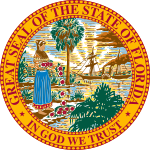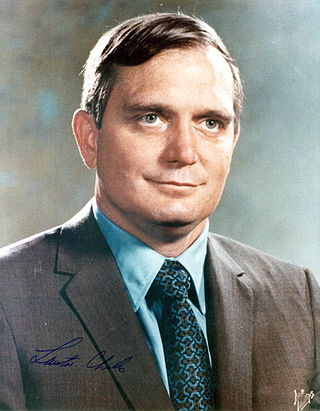
Lawton Mainor Chiles Jr. was an American politician and military officer. A member of the Democratic Party, he served as a United States senator from Florida from 1971 to 1989 and as the 41st governor of Florida from 1991 until his death in 1998.

Jack Eckerd was an American businessman and the second generation owner of Eckerd chain of drugstores.

Kenneth Hood "Buddy" MacKay Jr. is an American politician and diplomat who served as the 42nd governor of Florida from December 12, 1998, to January 5, 1999, upon the death of Lawton Chiles. A member of the Democratic Party, he previously served as the 14th lieutenant governor of Florida from 1991 to 1998. During his career, he also served as a state legislator and as a United States representative and special envoy. Following the death of Bob Graham in 2024, McKay remains the only living former Democratic governor of Florida.

Reubin O'Donovan Askew was an American politician, who served as the 37th governor of Florida from 1971 to 1979. A member of the Democratic Party, he served as the 7th U.S. Trade representative from 1979 to 1980 under President Jimmy Carter. He led on tax reform, civil rights, and financial transparency for public officials, maintaining an outstanding reputation for personal integrity.

George Harrold Carswell was a United States circuit judge of the United States Court of Appeals for the Fifth Circuit and a United States district judge of the United States District Court for the Northern District of Florida. He was also an unsuccessful nominee to the United States Supreme Court in 1970.

Thomas LeRoy Collins was an American politician who served as the 33rd governor of Florida from 1955 to 1961. Collins began his governorship after winning a special election in 1954, and was elected to a four-year term in 1956.

Claude Roy Kirk Jr. was an American businessman and politician who served as the 36th governor of Florida from 1967 to 1971. A Republican for most his career, he was the first Republican governor of Florida since Reconstruction.

The 1970 United States Senate elections was an election for the United States Senate. It took place on November 3, with the 33 seats of Class 1 contested in regular elections. Special elections were also held to fill vacancies. These races occurred in the middle of Richard Nixon's first term as president. The Democrats lost a net of three seats, while the Republicans and the Conservative Party of New York picked up one net seat each, and former Democrat Harry F. Byrd Jr. was re-elected as an independent.

Edward John Gurney Jr. was an attorney and an American politician based in Florida, where he served as a Representative and a United States Senator. Born and raised in Portland, Maine, Gurney moved to Florida after his service in World War II. Elected to the House of Representatives in 1962, Gurney was the second Republican elected to Congress from Florida in the 20th century.
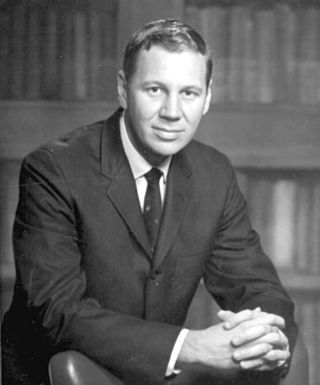
Louis Frey Jr. was an American lawyer and politician who served as a Republican member of the United States House of Representatives from 1969 until 1979. He represented Florida's 5th congressional district from 1969 to 1973 and the 9th district from 1973 to 1979, until he ran unsuccessfully in 1978 for the Republican nomination for governor to succeed the term-limited Democrat Reubin Askew of Pensacola.

Louis Arthur "Skip" Bafalis was an American businessman and politician who served as the U.S. representative for Florida's 10th congressional district from 1973 to 1983. A member of the Republican Party, he was the party's nominee in the 1982 Florida gubernatorial election, and previously represented district 33 in the Florida Senate from 1966 to 1970.

William Cato Cramer Sr., was an American attorney and politician, elected in 1954 as a member of the United States House of Representatives from St. Petersburg, Florida. He was the first Florida Republican elected to Congress since 1880, shortly after the end of Reconstruction. He was re-elected, serving without interruption until 1970.
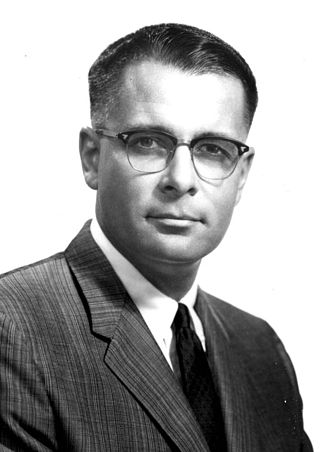
Thomas Burton Adams Jr. was an American politician from the U.S. state of Florida. A Democrat, he served in the Florida Senate (1956–1960), as Secretary of State of Florida (1961–1971), and as the tenth Lieutenant Governor of Florida (1971–1975).

The 1970 United States Senate election in Florida was held on November 3, 1970. Incumbent Democratic U.S. Senator Spessard Holland decided to retire instead of seeking a fifth term. During the Democratic primary, former Governor C. Farris Bryant and State Senator Lawton Chiles advanced to a run-off, having received more votes than Speaker of the Florida House of Representatives Frederick H. Schultz, attorney Alcee Hastings, and State Representative Joel T. Daves III. Chiles soundly defeated Bryant in the run-off election, scoring a major upset due to his comparatively small name recognition prior to the election. To acquire name recognition and media coverage, Chiles walked about 1,003 miles (1,614 km) across the state of Florida and was given the nickname "Walkin' Lawton".

The 1966 Florida gubernatorial election took place on November 8, 1966. During the primary election, the results from the Democratic Party were close among three of the four candidates. Thus, the top two Democrat candidates – incumbent Governor of Florida William "Haydon" Burns and Mayor of Miami Robert King High – competed in a runoff election on May 24, 1966. In an upset outcome, Robert King High was chosen over W. Haydon Burns as the Democratic Gubernatorial nominee. In contrast, the Republican primary was rather uneventful, with businessman Claude Roy Kirk Jr. easily securing the Republican nomination against Richard Muldrew. This was the first time a Republican was elected governor since Reconstruction.

The 1974 Florida gubernatorial election took place on November 5, 1974. Incumbent Democratic Governor Reubin Askew won re-election to a second term.

The 1988 United States Senate election in Florida was held on November 8, 1988. Incumbent Democratic U.S. Senator Lawton Chiles decided to retire instead of seeking a fourth term. Republican Connie Mack III won the open seat, becoming the first Republican to hold this seat since Reconstruction in 1875.
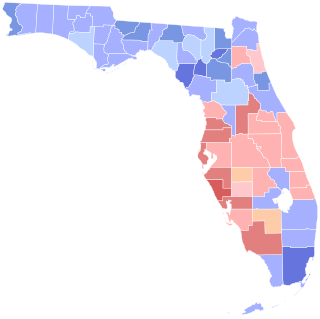
The 1974 United States Senate election in Florida was held on November 5, 1974. Incumbent Senator Edward Gurney, a Republican, declined to seek a second term after being indicted for taking bribes in return for his influence with the Federal Housing Administration. The primary for the Republican nomination pitted Eckerd drug store owner Jack Eckerd against Florida Public Service Commissioner Paula Hawkins. Eckerd won handily, receiving approximately 67.5% of the vote. The Democratic primary, however, was a crowded field with eleven candidates vying for the nomination. Because no candidate received a majority of the votes, U.S. Representative Bill Gunter and Secretary of State of Florida Richard Stone advanced to a run-off election. Stone won by a small margin of 1.68%.

The 1978 Florida gubernatorial election was held on November 4, 1978. Democratic nominee Bob Graham was elected, defeating Republican nominee Jack Eckerd with 55.59% of the vote.

